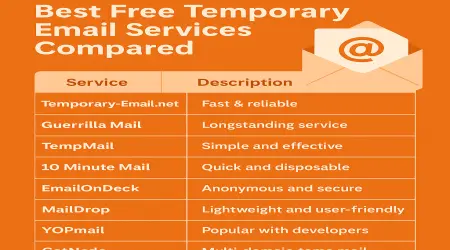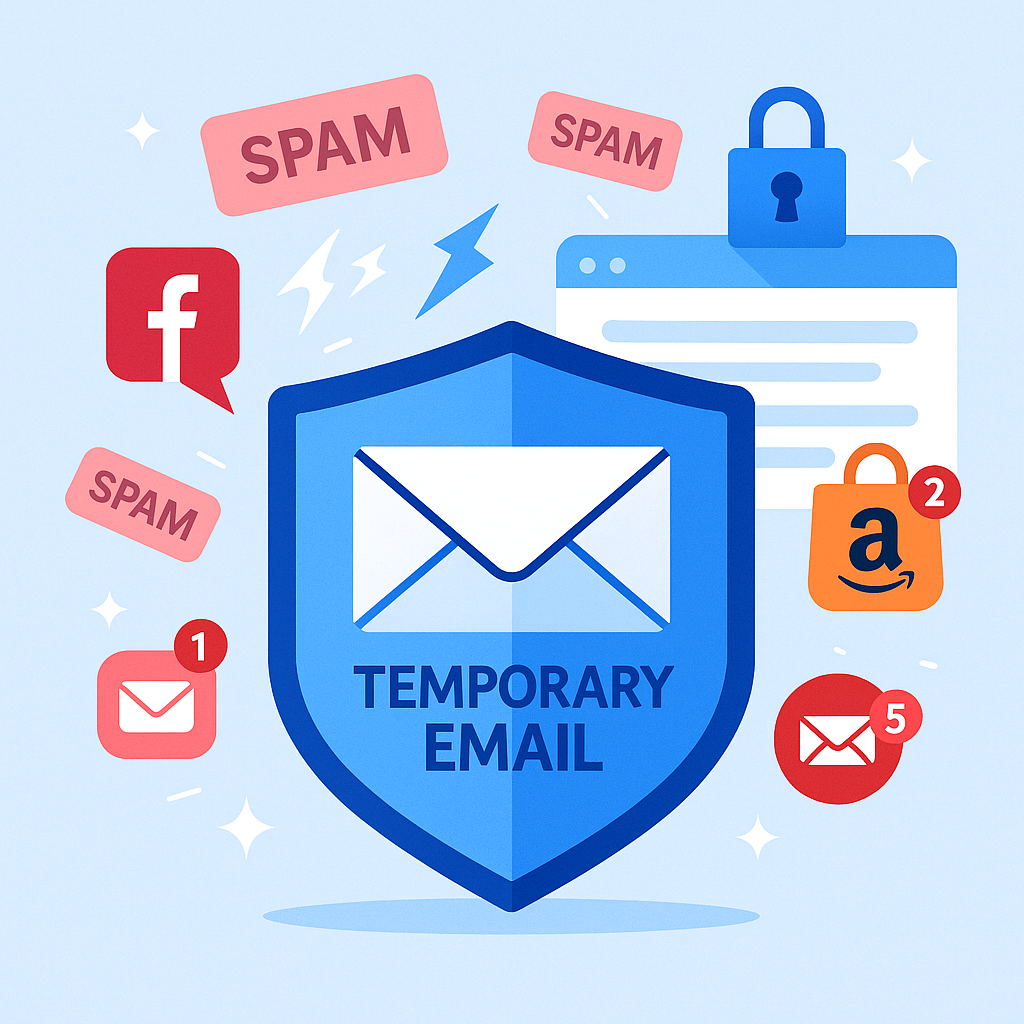

Is Temporary Email Safe? Pros, Cons, and Myths Busted (2025 Guide)
Introduction
Temporary email services — also called disposable emails — are widely used in 2025 for privacy and spam protection. They offer short‑lived, anonymous email addresses perfect for quick registrations, testing websites, or avoiding marketing spam.
But are they truly safe? Myths about temporary email abound: Are they anonymous? Can hackers access them? Are they illegal? This guide uncovers the truth about disposable emails, their benefits, risks, and best practices to help you decide if they’re right for you.
What Is a Temporary Email?
A temporary email (or disposable email) is an email address created for short‑term use. Unlike permanent accounts (e.g., Gmail, Outlook), temporary emails:
Require no registration or personal information
Expire after minutes or hours
Are often receive‑only (cannot send messages)
Auto‑delete messages after expiration
These services are widely used for one‑time verifications, anonymous browsing, and spam prevention.
How Do Temporary Email Services Work?
Visit a Provider: Services like Temporary‑Email.net or TempMail generate random email addresses instantly.
Copy the Address: Use it for sign‑ups, downloads, or testing websites.
Receive Emails: Check incoming messages (e.g., verification codes) directly on the site.
Auto‑Expire: After a set time, the address and messages are deleted permanently.
Pros of Using Temporary Email
1. Privacy Protection
Temporary emails keep your personal email hidden, preventing tracking and reducing exposure to breaches.
2. Spam Prevention
Sign up for newsletters or promotions without cluttering your main inbox.
3. Instant and Free
No sign‑up required; generate and use within seconds.
4. Perfect for Testing
Ideal for developers, QA testers, and marketers needing fake data for form validation.
5. Reduces Digital Footprint
Each disposable email disappears after use, leaving no trace online.
Cons of Using Temporary Email
1. Short Lifespan
Emails vanish after expiration — unsuitable for long‑term accounts.
2. Public Inboxes
Some services share domains; anyone guessing your address may view your messages.
3. Limited Features
No storage, forwarding, or recovery options; mostly receive‑only.
4. Blocked by Some Sites
Major platforms (e.g., banking, social media) often block disposable domains.
5. Not Fully Anonymous
While personal data isn’t required, some services log IP addresses for security.
Myths About Temporary Email — Busted
Myth 1: Temporary Emails Are Illegal
Fact: Using disposable emails for privacy or testing is legal. Illegal use (fraud, scams) is punishable, not the tool itself.
Myth 2: They’re 100% Anonymous
Fact: Most services don’t require personal data, but IP logging may occur. Combine with VPNs for full anonymity.
Myth 3: Hackers Can Easily Steal Your Temp Email
Fact: Public inboxes can be accessed if someone knows the exact address — use private disposable email providers for safety.
Myth 4: They Replace Permanent Emails
Fact: Disposable emails are for short-term use only — not for work, banking, or personal communication.
Myth 5: Temporary Email = Spam Tool
Fact: While spammers may misuse them, millions of legitimate users rely on disposable emails for spam prevention and privacy.
When to Use Temporary Email Safely
Signing up for newsletters, freebies, or contests
Testing new websites or apps
Avoiding spam on public Wi‑Fi
Accessing region-locked content without exposing personal data
Creating secondary social media accounts for marketing or research
When NOT to Use Temporary Email
Banking, government, or healthcare accounts
Long-term subscriptions requiring password recovery
Professional communication or personal branding
Platforms requiring high-security verification (2FA, identity proof)
Safety Tips for Using Temporary Email
Choose Private Providers: Prefer services with private inboxes (e.g., Temporary‑Email.net).
Combine with VPN: Hide your IP address for maximum anonymity.
Avoid Sharing Sensitive Data: Never send passwords or confidential info via disposable emails.
Check HTTPS: Ensure the site is secure (padlock icon) before using.
Delete After Use: Clear browser cookies and close the session.
Top Secure Temporary Email Services (2025)
1. Temporary‑Email.net
Private inboxes and auto-expiration
Mobile-friendly and clean interface
Perfect for privacy-conscious users
2. TempMail
Widely known and accessible
Multiple domains and auto-refresh inbox
Public inbox (less private)
3. 10MinuteMail
Classic 10-minute disposable emails
Extendable lifespan for longer tests
4. Guerrilla Mail
Custom usernames and spam filters
Public inbox system with optional encryption
5. Teamail
Next-gen service with encrypted temporary emails
Flexible expiration and mobile-friendly
Comparison Table: Temporary Email Safety
| Feature | Public Temp Mail | Private Temp Mail |
|---|---|---|
| Privacy | Low (shared inbox) | High (private inbox) |
| Anonymity | Medium (IP logged) | High (combine with VPN) |
| Spam Protection | Good | Excellent |
| Security | Basic encryption | Optional advanced |
| Use Cases | Quick sign‑ups | Anonymous testing |
Temporary Email vs Permanent Email: Which Is Safer?
Temporary Email
Safer for quick, anonymous sign‑ups
Auto-deletes data after use
No long-term commitment
Permanent Email
Safer for personal and professional accounts
Offers recovery, storage, and advanced security features (2FA)
Essential for banking, government, and subscription services
The Future of Temporary Email (2025 and Beyond)
Trends shaping disposable emails:
AI-driven spam filtering for smarter inboxes
Custom domains for branded anonymity
Integration with password managers for seamless usage
Encrypted disposable addresses for high-security environments
Blockchain-based disposable identities for advanced privacy
FAQs About Temporary Email Safety
Q: Are temporary emails completely safe?
A: Safe for basic use (sign-ups, testing). Avoid sensitive data — they lack full encryption and recovery.
Q: Can temporary emails be traced back to me?
A: Some services log IP addresses; using a VPN enhances anonymity.
Q: Are temporary emails blocked by major sites?
A: Yes, some websites block known disposable domains for security reasons.
Q: Is using temporary email illegal?
A: No — only fraudulent use is illegal.
Q: How long do temporary emails last?
A: Typically 10 minutes to 24 hours, depending on the service.
Conclusion
Temporary email services are safe — when used correctly. They protect your personal inbox, prevent spam, and offer anonymous sign‑ups for low-risk activities. However, they’re not a substitute for permanent email in critical accounts like banking or government platforms.
In 2025, combining temporary emails with VPNs, secure browsing, and privacy tools ensures maximum online protection. Use them wisely to enjoy the benefits of anonymity while staying safe from risks.
Target Keywords
is temporary email safe, disposable email privacy, pros and cons of temp mail, anonymous email myths, temporary email security tips

